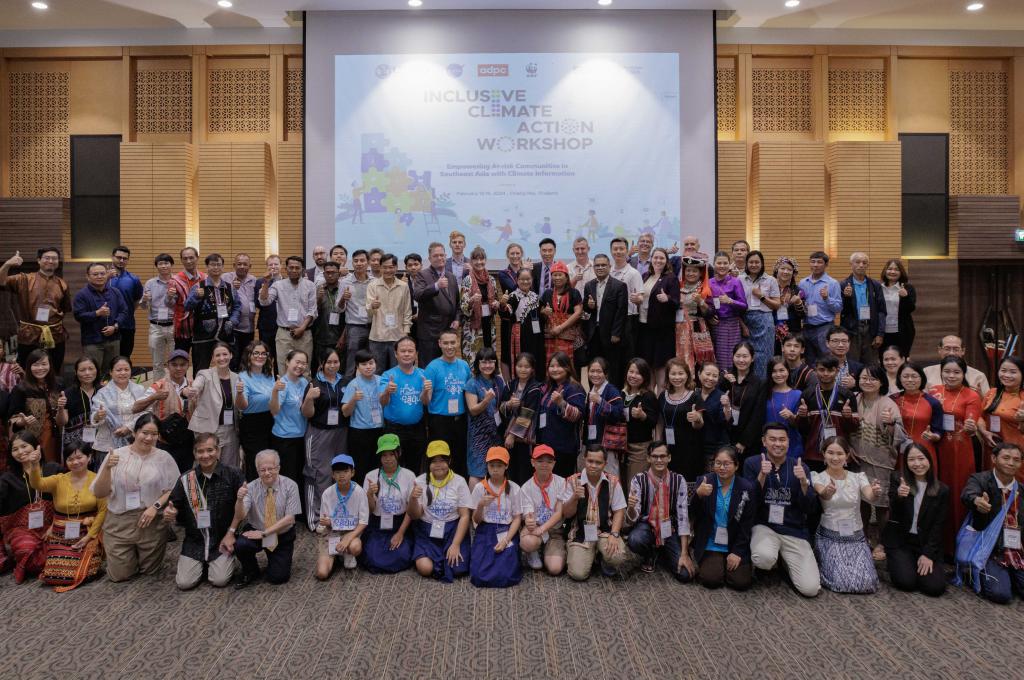Marginalized, Vulnerable Groups Call for Inclusive, Understandable, Actionable Climate Information

Chiang Mai, Thailand, Feb. 16, 2024 - After more than 40 presentations and workshops, participants of the “Inclusive Climate Action Workshop: Empowering At-Risk Communities in Southeast Asia with Climate Information” (#ICAW2024) ended their deliberations by identifying strategies to make climate information more inclusive and accessible to underrepresented communities.
The discussions of the five-day workshop will help SERVIR Southeast Asia to co-create new or refine its existing tools so local communities can further implement more socially inclusive climate actions that incorporate gender equality and the perspective of women, girls, youth, the elderly, and Indigenous communities.
Throughout, the discussions highlighted the need to include frontline communities in more inclusive climate action processes so marginalized groups can have better access to environmental data and information, that the information is delivered in ways they can understand, and that the information is actionable.
With universal emphasis on the theme that marginalized and at-risk communities are disproportionately affected by climate change, the workshop started with presentations and narratives of “local champions,” groups whose climate action projects have not only showcased their struggles but also their resilience and innovations in the face of adversity.
Indigenous groups, too, had a clear message: They are not passive victims of climate change, but an important part of solutions.
“[Indigenous communities] are not just a vulnerable group, but also important protectors of biodiversity and the environment,” said Pirawan Wongnithisathaporn, Environment Program Officer for the Asia Indigenous Peoples Pact, speaking about the pitfalls of climate action that does not include Indigenous communities.
“Historically, we’ve been excluded from decision-making…Land rights are in decline due to the demand for green spaces, and countries take rights away from Indigenous groups in order to adapt to climate.”
#ICAW2024 was co-organized by SERVIR Southeast Asia and the Mekong for the Future, the latter a partnership between the U.S. Agency for International Development (USAID) and the World Wildlife Fund. The workshop included nearly 100 participants from Cambodia, Lao PDR, Philippines, Thailand, and Vietnam.
USAID, U.S. National Aeronautics and Space Administration (NASA), and the Asian Disaster Preparedness Center (ADPC) launched SERVIR SEA in January 2023 to help communities across Southeast Asia adapt to regional and transboundary climate issues and mitigate the impacts of climate change. SERVIR SEA receives NASA satellite imagery and data and uses them to help Southeast Asian governments and communities respond to natural disasters and build climate resilience.
Climate change affects communities with people of various ages and socio-economic conditions differently from one country to the other. To bring the point closer, and help find solutions, participants highlighted various methodologies through which information can be not only received but understood. As example, recognizing language barriers between countries and communities, participants went through an exercise in explaining their understanding of climate change challenges through drawing.
Even then, the emphasis was on local knowledge.
Siriya Pulek, a nurse attending from northern Thailand’s Doi Sakhet community, spoke to the importance of prioritizing this local knowledge, especially from Indigenous groups and women:
“We need to ask not what Indigenous women can learn from society, but what society can learn from Indigenous from Indigenous communities.”
While a number of problems dealt with a wide range of causes --from globalization, industrialization, and urbanization to the changing nature of agricultural practices and the privatization-- others pointed to the lack of government regulation and enforcement. Some drew attention to limitations on receiving accurate air pollution data in a timely manner, or the capacity to deal with the alerts speedily enough in times of disasters such as floods or unexpected increase in air pollution levels.
Air pollution often crosses national borders, exacerbating the problem for individual countries and requiring international cooperation.
“Industry and agriculture boomed in Lao PDR after COVID-19, but that economic growth has come with air pollution,” said Dr. Souvannsa Phengsisomboun, a professor of environmental science at the National University of Laos. She emphasized the importance of including more communities from across the region in addressing the issue.
“We should not be pointing blame between countries—we should not be asking who is and who is not doing [agricultural] burning, but we should be finding solutions together.”
Participants also spent an entire day on identifying the role of communications in spreading information to their communities, and ways communications methods and activities can advance awareness raising and advocacy goals of Indigenous, women, youth, and disabled groups.
To make the discussions more pointed, participants were divided into focus groups on three main subjects: Flood/Drought; Air pollution; and Deforestation.
The last day of the workshop concentrated on finding a strategic roadmap for including gender equality and social inclusion (GESI) into future climate actions. Participants highlighted the importance of empowering community participation in the development of inclusive community plans, emphasizing the role of gender equality and social inclusion.
In the end, they argued, climate action solutions can only be effective if they are equally equitable.



